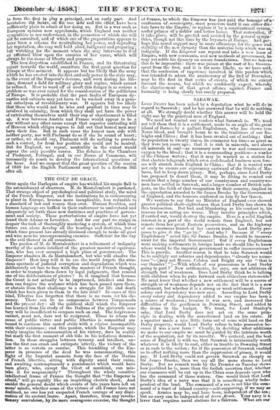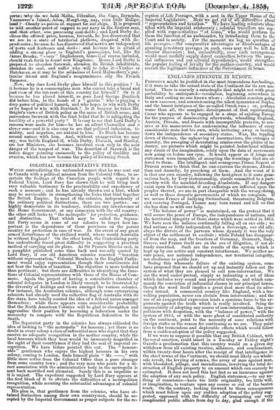SARAWAK.
right one by the practical men of England. Loan DERBY has been asked by a deputation what he will do in regard to Sarawak; and he has answered that he Will do nothing at all. We strongly doubt whether • this answer will be held the
7 '
INTe need not remind our readers what Sarawak is. We need not tell them that it is a settlement, made in an angle of the great island of Borneo by a gallant Englishman, who has shown true Norse blood, and brought home to -iis the traditions of our Ra- leigha and (lives that it has been created out a nothing; that its population is, twenty times, its commerce ten times as grcat as they were ten_ years ago ; that it is rich in minerals, and, above all minerals in coal—as necessary now to war and commerce an oxygen to the blood ; that it is a commanding position—a warder of the Chinese waters ; that it may be wanted as a station for that electric telegraph which even cool-headed business men fore- see will stretch from England to China ; that it is wanted now not only to ensure our supremacy eastward of the Straits of Ma- lacca, but to keep down piracy. But, perhaps, since Lord Derby has proposed to desert them, it may be fitting to remind our readers that a large number of our countrymen and countrywo- men have settled in Sarawak, and a larger number of British sub- jects, on the faith of that recognition by their country, implied in the approbation awarded to Sir James Brooke by the Government of England, and the honours conferred on him by her Queen. We venture to say that no Minister of England ever showed greater political short-sightedness than Lord Derby has shown in this transaction. But bad and blundering as his conduct is, his reasons for so acting are worse. They involve principles which, if carried out, would destroy the empire. Here is a solid English interest in a part of the world remote from England, but not remote from her great Eastern possessions and on the highway of one enormous branch of her eastern trade. Lord Derby pro- poses to give it the "go by." And why ? Because if " every Englishman" acted like Sir James Brooke, it would be inconve- nient for the imperial Government! But if every Englishman went making settlements in foreign lands we should like to know where would be the imperial government to suffer inconvenience ? This is puerile. Another reason is that to take Sarawak would be to multiply our colonies and dependencies "already too nume- rous "—[may not Messrs. Cobden and Bright ery. out "that is our thunder ! "]—With which of our possessions is Lord Derby going to part ? New settlements, he says, are not additions of strength but of weakness. Does Lord Derby think he is talking with children when he puts forward such ridiculous statements ? He must know that whether a new settlement will be a source of strength or of weakness depends not on the fact that it is a new settlement, but whether it is a strong or weak settlement. Every colony and dependency was new once. According to Lord Derby every colony and dependency added to our empire has been a a source of weakness ; because it was new, and increased the difficulties of the gentlemen in Downing Street, and added to the items in the budget. We trust, for Lord Stanley's sake, that Lord Derby does not act on the same prin- ciple in dealing with the unreclaimed land on his estate. If a squatter made a nice little farm out of some wild land on the Der-by property, would Lord Derby refuse to take possession be- cause it was a new farm ? Clearly, in deciding what additions we make to our empire we must be guided by the intrinsic worth of the acquisition, not by its novelty. We contend, and the best sense of England is with us, that Sarawak is intrinsically worth whatever it is likely to cost, either in trouble to Downing Street or in cash to the nation ; ffir if the possession of Sarawak enabled us to effect nothing more than the suppression of piracy, it would pay. If Lord Derby could not govern Sarawak as cheaply as Sir James Brooke, then we say all the more shame to Lord. Derby. But no remark made by the Premier on Tuesday shows how purblind he is, more than the foolish assertion that, whether our commerce will be cut up in the China seas depends upon who has the command of those waters. One would think that Lord Derby's idea of a navy was that it is something wholly inde- pendent of the land. The command of a sea is not like the com- mand of a tract of inland country—self-supporting, if we may so speak. Armies may be, and have been, independent of the sea; but no navy can be independent of terra jfrrnr. our navy is a lever that requires naval stations for a fulcrum. What are our pOelsasuarhy '3dos.wsl, Istaft*Eatass..0i.h.*filar, the, , Cope,„llermuda,
Vjansioireer's even litty
?lifOloarlyfaslipoiutstikfstRaPint ferr ships. It,P.1.11i4posed toilidd,estraotbarfposntof suppeA to our navy in the,Eassii seas, ansintlurtpther, itimet.spossesaisig".coal-fields ; and LA Derby du- clinesithe offetecliprize,f.beegnso, 'forsooth, he has discovered that Ore. in.: -asaitate , of territorial plethorp.,,.slnopsical with de- pondeocies ;liecausehe has discovered that navies. are independent off 'opts. and lhanboura and. docks; and because lie is afraid of g :strong :place. to England's possessions, lest, like Sir Utiles Brooke, " every Englishman himself ef course included, shes,ltlinshissijs to:felon:I new Kingdoms. Hence lord Derby is prepared.!to. abandon .5arnwals, a,bandoa its Rritish inhabitants, ablation- its coal, and .elers,who„will to .take it—Yankee Or Hotelman, or it maybe the, soldadoes Of Loa1441mesbury's par- tietlar frieral and: England's magnanimous ally the French ovi.lkhy-does Lord Del* place himself in this position 9 Is itisedlinse ho is a-commonplave man who cannot take abroad and just view of theinterects.nflthis country ler himself ? Or is it because he has placed himeelf, as poor Lord George Beutinelfi didlefore him, lathe. hands of a " genius " who is playing a deepigaturofpolitital hazard; and who hopes to win with Derby agar` hoped to win, i Bentinek. 9 Is it because he takes Mr. Bright's-viets of pelley as the acme of Rritish sense, surrenclera Sariarals.witlifthe fond ;belief that he is mitigating.t e hostility of a powerful party? It is easy to see that Lord. Derby's reiisons were made- for him,—he has an adroit Chancellor and a dryer son-,and it is oleo easy to see that political indecision, ti- Midity,. -and negation, are natural to him. To flinch has become second nalure: -with, him. A.md, without exaggeration we may say,- Woe betide England while Derby, Disraeli, and Stanley, are her ,Ministers, she becomes involved even only in the near danger of -the tempest:of war. The desertion of Sarawak is the index finger pointing ominously to the policy of timidity and evasion, which has now become the policy of Downing Street. cepted by the Imperial Government as proper subjects for the q .,fri-.,ITI i s,c eptinin (0/*E.ffgessi --44e Ri Ma o7'11, PIffi..etie-" : 61



































 Previous page
Previous page